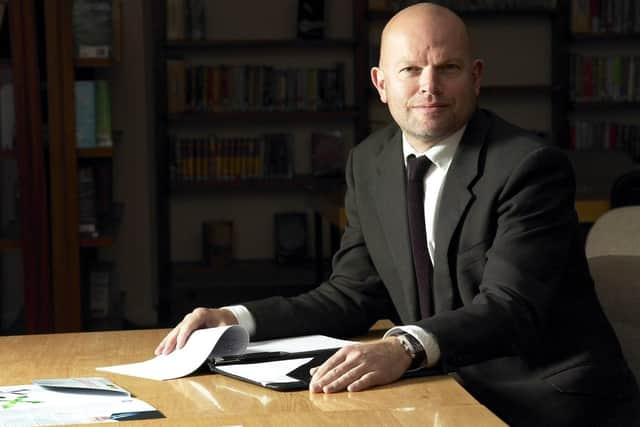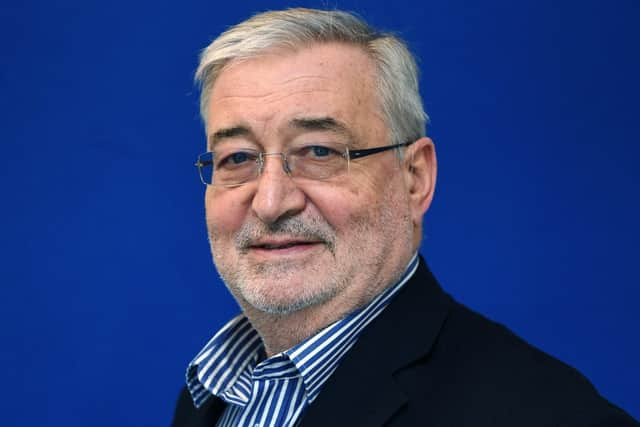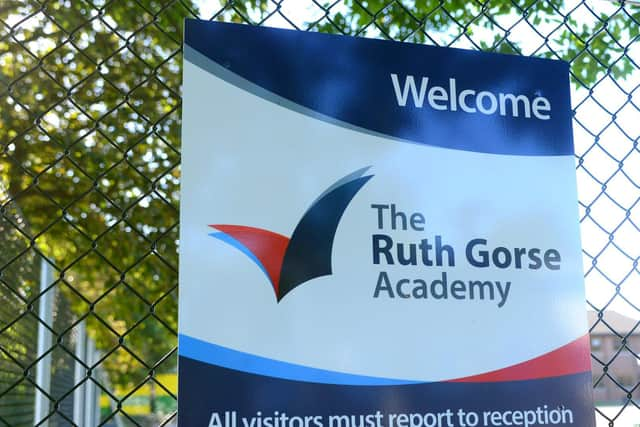School boss calls for high-earners in Leeds to contribute to coronavirus relief fund
and live on Freeview channel 276
As the Yorkshire Evening Post shines a spotlight on education in the city this week, Emma Ryan spoke to the schools’ boss who wants to see a relief fund set up to help those affected by the coronavirus pandemic.
Sir John Townsley is the chief executive officer of the Gorse Academies Trust and, as we look at the role of academies in Leeds education as day three of a special series, he makes the call due to concern about the impact the crisis will have on the country’s poorest children and young people.
Contribution
Advertisement
Hide AdAdvertisement
Hide Ad

He has said public sector professionals and those in the private sector whose jobs remained secure and well-paid, earning more than £75,000, might choose to make a 15 per cent contribution, while those on £100,000 a year or more could contribute 20 per cent.
Sir John said: “We know millions of people working in the private sector or self-employed are already struggling and businesses are going to the wall. If the Government set up a centrally held fund, then anyone who wished to could pay into it to support those facing the greatest levels of challenge. There would be no compulsion and no minimum or maximum.
“This is about enabling everyone who wants to, to contribute, and is not about setting the public sector against the private sector. This is simply about everyone who can help coming forward to support those suffering hardship.
“The public sector has had several years of pay freezes and pay restraint, and is of course front and centre of the national effort at this time of need – our heroic NHS, teachers and emergency services.
Advertisement
Hide AdAdvertisement
Hide Ad

“Such an approach would potentially release tens of millions of pounds which could be used by the Government to support families and smaller businesses facing greatest need during this period.”
Academies
The Yorkshire Evening Post met Sir John Townsley just before the lockdown of schools to discuss the role of academies in Leeds.
He says the Gorse Trust’s main aim is to remove the link between poverty and academic underperformance.


He points to south Leeds and the impression that the sought after school places are in the north of the city.
Advertisement
Hide AdAdvertisement
Hide AdSir John said: “I was head at Morley in 2003 and the south of the city became the worst performing in terms of secondary education. Now it is the strongest and what that means is that a family without access to very high salaries and opportunities has a chance of going to an excellent or outstanding school and that changes the game for children.
“People have had to up their game in the south because places like Morley or Cockburn have been setting new standards. Everyone has a requirement to operate at that kind of level of aspiration.”
School catchment
There are 1600 pupils at Morley and the majority walk to school as there is no school bus, having a positive impact on the environment, but he adds, helping to address the issue of families moving house so they can get into the catchment area for the school place they want.
He said: “Overall in the city, people move out of the city centre at secondary level in search of better education and we believe that has to stop. We want children to be able to go to their own school.”
Advertisement
Hide AdAdvertisement
Hide AdIt also dispels the myth that academy trusts set up in ‘more affluent areas’ as it creates better results.
Sir John explains: “I am surprised by those comments. There are schools in all these areas - north and west that have more privileged communities. Some have chosen to be academies and some are local authority schools.
“It is almost impossible to open a new school because you have to be able to prove the significant impact of a new school on children from less advantaged backgrounds - and it has to be sizeable.”
Transformation
It is also the mission of the Gorse Trust to take on underperforming schools and transform them into schools that are achieving outstanding results and are places that families want to send their children to.
Advertisement
Hide AdAdvertisement
Hide AdWhen it inherited Bruntcliffe Academy, previously Bruntcliffe High School, in 2015 the exam results of that and the previous year put it in the bottom 10 per cent of schools nationally for achievement and parents were staging protests.
Sir John recalls: “There were 1,650 pupils and the year 11 group had 68. It had reached a point where families had abandoned the school. We inherited buildings that were not fit for purpose and were a series of 1960s’ buildings.
“We are now in a building that is fit for students of the 21st century. This does take time and we don’t take more than one of these major projects at any one time. Opening a new school, like Ruth Gorse, is a big challenge but nowhere near taking on an existing school that is inadequate.”
Hillcrest Primary Academy, at Chapel Allerton, had £1m invested in 2013.
Advertisement
Hide AdAdvertisement
Hide AdBy 2016 it was judged to be outstanding and now has world class status.
Bureaucracy
The difference between what an academy can do, says Coun Peter Gruen, a Leeds City Council member but also vice-chairman of the Gorse Academies Trust Board, is red tape.
Mr Gruen, who is set to stand down from his councillor role later this year to spend more time working with the Trust, said the key is the speed that academies can make changes.
There is a chief executive and a board of trustees and no other intervention is needed to make changes.
But how are those changes made in the classroom?
Advertisement
Hide AdAdvertisement
Hide AdSir John adds: “Once we are asked to do that and tasked with the specific job of turning a school around, generally speaking, children are children and there is nothing wrong with them, only the school they are responding to and the professional standards and expectations in place. Overall it comes to professional standards and leadership.
“We have to deal with that in a manner which is supportive and compassionate, but robust. You have to make significant alterations in the way in which people are working, people recognise they are not part of the school’s future, bringing in new colleagues that have a proven track record of doing great things.”
There is, he adds, a greater freedom with the curriculum but it largely follows the same protocols that local authority schools do and the 11 academies in the Gorse family are, stresses Sir John, open to working with local authority schools.